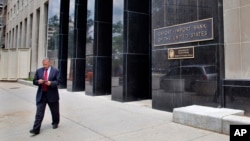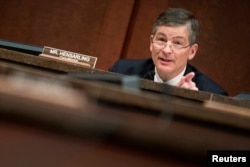An agency that supports U.S. exports faces key votes on its survival this week in Congress as supporters try to revive the Export-Import Bank.
Ex-Im has been helping U.S. companies export their goods and services for decades, with expertise, financing for prospective foreign buyers, and a kind of insurance that U.S. companies buy in case a foreign customer cannot pay for goods it has ordered.
The Ex-Im Bank was usually supported by members of both political parties, but came under attack recently by some of the most conservative Republicans. They were able to block efforts to renew the government agency’s charter several months ago.
Under the complex and arcane rules of the U.S. Congress, supporters hope to revive the bank by attaching its reauthorization to a large bill that would fund highway projects across the nation for several years. The highway bill is completely unrelated to foreign trade, but it is a huge and popular measure that is likely to pass.
Ex-Im opponents hope to tangle that process with a flood of amendments, including 15 ideas alone from House Financial Services Committee Chairman Jeb Hensarling.
Analyst Tim Carney, who writes about politics and economics for a conservative newspaper and researches these issues at the American Enterprise Institute, says there is about a “50-50 chance” that the bank will survive.
In his view, Ex-Im is bad because politicians, rather than market forces, allocate the help and resources it distributes. Like some other conservatives, he calls the bank an example of “crony capitalism” and says it corrupts Washington.
He also argues that Ex-Im gives most of its help to huge multi-national companies like Boeing Aircraft, based on their effective lobbying rather than their demonstrated need. He also disputes Ex-Im’s assertion that the fees it collects yield a significant profit. Carney says a more businesslike approach to accounting would show a loss.
Ex-Im supporters, including a business group “Exporters for Ex-Im,” say the bank uses the accounting system required of all federal government agencies, funds all of its own operations, and turns hundreds of billions of dollars a year over to the U.S. Treasury.
Peterson Institute for International Economics scholar Caroline Freund, who supports Ex-Im, says it is “very likely to survive” and puts the odds at above “95 percent.”
She says Ex-Im provides financing when private lenders lack the skill and experience to evaluate the risk of working in distant developing nations.
While developing nations may not be familiar to some U.S. banks, economic data show emerging economies are generally growing more quickly than wealthier nations and offer more opportunities for companies seeking to expand.











